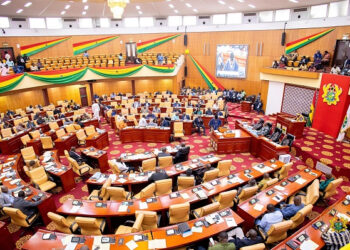Odeefour Amoakwa Boadu VIII, Vice Chairman of the Public Interest and Accountability Committee (PIAC) has called on the Ministries of Finance and Fisheries to expedite the completion and operationalization of the Anomabo Fisheries College.
Speaking at a media briefing on the 2024 PIAC semi-annual report, Odeefour Amoakwa Boadu VIII emphasized the importance of the Fisheries college in maximizing Ghana’s potential in the fisheries sector, describing the current delays as deeply concerning.
Odeefour Amoakwa Boadu VIII, also the President of the Central Regional House of Chiefs, mentioned receiving assurances from the relevant sectors and expressed hope that the institution would be functional soon.
However, he said money for the projects must be made available before the project begins.
“We must sell the region, attract investments in the region, and ensure people understand what we deserve or need.”
He argued that the Anomabo Fisheries College is the first Fisheries University in West Africa adding “the idea has been there for several years but unfortunately we are not reaping the benefit.”
Odeefour Amoakwa Boadu VIII believes collaborative work will realize the benefits.
Relatedly, PIAC is urging the government to demonstrate greater commitment to its industrialization agenda by allocating a larger share of petroleum revenues to support growth-driving industries.
ICYMT: Stonebwoy: “No artist in my class filled Accra Stadium like I did.”
The committee’s 2024 semi-annual report revealed that no petroleum revenue was allocated to industrialization in the first half of the year, despite the government designating it as a priority area.
According to PIAC Coordinator, Mr. Isaac Dwamena, this continues a downward trend in funding for the sector since 2020.
Mr. Dwamena, briefing journalists in the Central Region, criticized the lack of commitment to industrialization, describing it as a missed opportunity to foster job creation, enhance tax revenue, and accelerate development.
He underscored the need for resource revenue to be invested in growth pillars like factories to ensure it continued economic benefits following the depletion of that resource.
“If government selects industrialization as priority area, then allocates zero Cedis, how can that be justified?…On one hand, you have done so well, and on another hand, you have done nothing.”
Source: Anthony Sasu Ayisadu/ATLFMNEWS



























